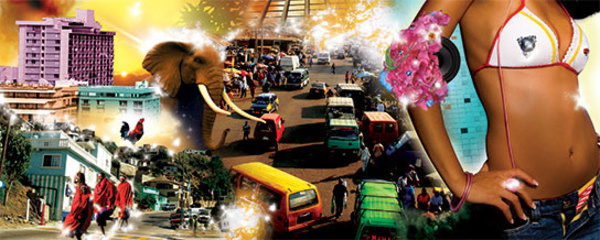What Is It? Kuduro
Move over, baile funk. The newest word in Portuguese bass music is kuduro, a genre […]
What Is It? Kuduro
Move over, baile funk. The newest word in Portuguese bass music is kuduro, a genre […]

Move over, baile funk. The newest word in Portuguese bass music is kuduro, a genre that hails from South Central… South Central Africa, that is. Bubbling up from the ghettos of this former Portuguese colony, kuduro (which translates as “hard ass”) combines the sounds of European techno and hard house with insistent, often vocoder-filtered Creole vocals and driving rhythms inspired by native dance music genres like kizomba and semba (the predecessor of samba).
According to F Communications’ resident Afro-house expert, French DJ/producer Frederic Galliano, the music–and the curiously aggressive, rubber-limbed booty dancing that goes with it–was created by Angolan Tony Amado in 1996. “[Tony’s] idea was to do real Angolan music with the power of house music with the traditional ancestral percussion,” says Galliano, who first encountered the genre during an April 2005 trip to Luanda, the country’s capital. In January, he released Frédéric Galliano Presents Kuduro Sound System (Frikyiwa), and he’s currently working on a project that brings baile funk MCs from Rio de Janeiro, Brazil together with kuduro beats.
“The average kuduro beat is quite a bit faster than baile funk, and it’s got a lot more auto-tuned, Cher ‘Believe’-type vocal effects,” explains Vancouver, BC DJ Paul Devro, a bass fiend who discovered the genre when Lisbon, Portugal-based Buraka Som Sistema hit him up on MySpace. BSS are a Portuguese-Angolan DJ/production crew that has played alongside the likes of Klaxons and MSTKRFT, and recently remixed Diplo’s Brazilian ingénues Bonde Do Role. Their From Buraka to the World EP is kuduro-influenced, but tracks like the insistent “Sem Makas” boast more sophisticated production and far less of the raw vocals that are a staple in Angolan productions.
There’s some debate as to whether or not BSS are the genuine article. (“Kuduristas are really critical of Portuguese people who try to do kuduro,” says Galliano. “The composition of kuduro beats are really, really strict.”). Nonetheless, the group is largely responsible for introducing the MP3-blog fiends to the kuduro sound and pushing the music to the world (via sales of the EP on iTunes).
“A lot of kuduro has that raw drum feel to it–if you deliver it right, the crowd’s gonna be into it,” says Devro, who rocks unsuspecting clubgoers with the sound at his Salon Des Bourgeoisie parties. Meanwhile, Galliano is taking a more purist approach. “I want to play kuduro as (they do in) Luanda: sexy, funky, underground, dirty,” he says. “Don’t forget: The boss of rhythm is Africa!”

